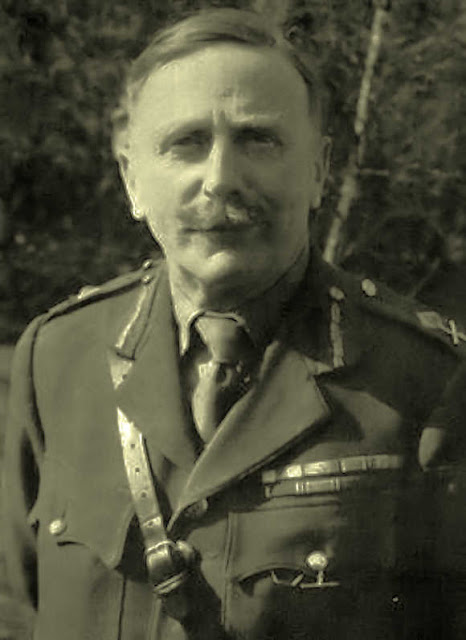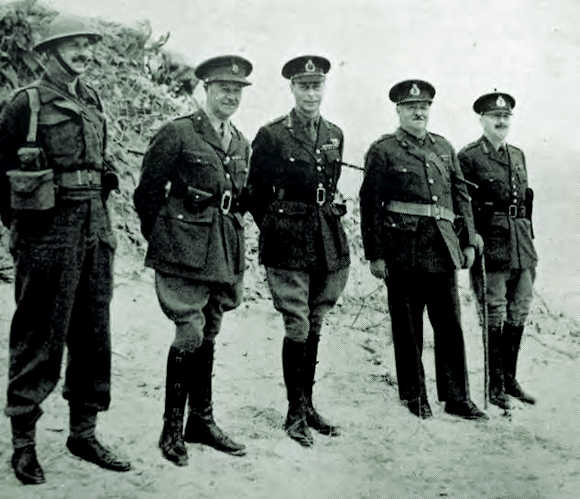 |
| First World War Lieutenant Beckwith-Smith |
“On the front of the 1/Coldstream, just east of the Troyon factory road, the Germans had run out a sap, and it was decided to fill it in. At 8 P.M. a platoon of the battalion, led by 2/Lieut. M. Beckwith-Smith (who was wounded …), crossing the hundred yards of No Man's Land, rushed the trench with the bayonet.”
 |
| Second World War: Major General Beckwith-Smith |
 |
| Beckwith-Smith on Right with King George VI Prior to Departure for Singapore |
He was then given command of the newly formed 18th (East Anglian) Division, made up of second-line territorials. In late 1941 the 18th sailed for India, but at Cape Town a brigade was diverted to Malaya. Beckwith-Smith and the remainder were later rushed to reinforce Singapore, arriving on 20 January 1942.
The Japanese landed on Singapore Island on 8th February 1942. Although not outnumbered, Lt. General Arthur Percival surrendered his forces a week later.
In August 1942, Beckwith-Smith was moved to Taiwan (then Formosa). Before leaving he sent this message to his men:
On my departure for Japan I wish to take what may be my last chance to thank all ranks of the 18th Division for their cheerful service and loyal support on many shores and seas during the two years I have had the honour to command the Division. I regret I have been unable to lead you to the success in battle to which your cause and sacrifice is entitled, and although I leave you with a heavy heart, I carry with me many precious memories and a sense of comradeship such as could only have been inspired by the trials and disappointments which we have shared in the last few months. Difficult days may still be ahead, but I know that the spirit which today animates all ranks of the Division will prevail and will form the corner-stone on which one day a just and lasting peace will be found. God grant that day may not be long delayed and that we may soon meet again. Meanwhile GOOD LUCK, HEADS UP, KEEP SMILING.
Indeed, difficult days were ahead for his men; they were sent to work on the infamous Burma Railway. As a result, over a third of them died. They would not meet again; he died on 11 November 1942. He was the highest-ranking Allied officer to die in the Taiwan camps.
In 1946, the Taiwan POW remains were re-buried in the Sai Wan Bay War Cemetery, Hong Kong. Beckwith-Smith’s memorial at his family’s parish church has this inscription:
And so it befell that when the hour of trial came, these men gave an example of courage and devotion the memory of which will never perish.
Michael Snape has written a new biography of Merton Beckwith-Smith entitled Forgotten Warrior, which is available from Amazon.
Sources: Christ Church College, Oxford

No comments:
Post a Comment